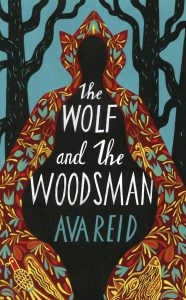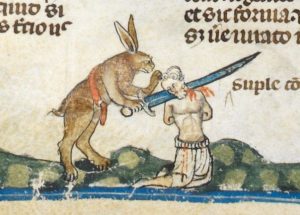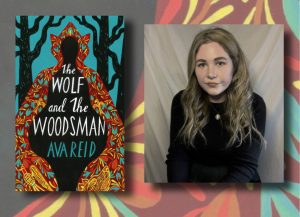Interview with Ava Reid (THE WOLF AND THE WOODSMAN)
Ava Reid was born in Manhattan and raised right across the Hudson River in Hoboken, New Jersey, but currently lives in Palo Alto. She has a degree in political science from Barnard College, focusing on religion and ethnonationalism. She has worked for a refugee resettlement organization, for a U.S. senator, and, most recently, for an AI robotics startup. The Wolf and the Woodsman is her first novel.
Welcome to the Hive, Ava.
Congratulations on your debut The Wolf and the Woodsman! Can you tell us a little bit about it? What can readers expect?
The Wolf and the Woodsman is an epic but literary-leaning standalone fantasy primarily focusing on religious issues in medieval Eastern Europe. It’s bloody and brutal (some might call it grimdark, though I’m ambivalent to that label myself) but I think ultimately hopeful. I’ve described it as a story about stories—the power that they have, and what it means when you are excluded from them.
Well that sounds awesome!
Tell us a little something about your writing process – do you have a certain method? Do you find music helps? Give us a glimpse into your world!
I don’t outline, which freaks a lot of my fellow writers out! I’m a thematic writer, so I do a lot of brainstorming that basically takes the place of outlining, for me. All my books coalesce around a central theme and the details shake out as I write. It makes revising pretty miserable, but it’s the only way I can successfully write a first draft.
Speaking of worlds, your book is inspired by Hungarian history and Jewish mythology, which sounds absolutely fantastic. Can you tell us a bit more about how you drew inspiration from both of these? Did you have to do a lot of research?
 I did, most of it centered around the history of medieval Hungary—its demographics, its royalty, and its identity (yes, countries have identities too!) Christianity is what unites Europe, but there was still a significant and influential pagan element, so Hungary was sort of undergoing an identity crisis over what kind of nation it wanted to be. There were a lot of oppositional forces.
I did, most of it centered around the history of medieval Hungary—its demographics, its royalty, and its identity (yes, countries have identities too!) Christianity is what unites Europe, but there was still a significant and influential pagan element, so Hungary was sort of undergoing an identity crisis over what kind of nation it wanted to be. There were a lot of oppositional forces.
Because the nation’s identity was so fraught and contested, it was a very brutal world. Paganism was oppressed and annihilated with swift, breathtaking violence. I also read a lot of political monographs about state-building, religion, and identity, by authors like Benedict Anderson, Charles Tilly, and Edward Said. Those were arguably my biggest influences.
As for the Jewish elements, I have always been drawn to the story of Queen Esther (around which the holiday of Purim is centered). It’s essentially a story about the power of rhetoric. I used that as a starting point. In a way, The Wolf and the Woodsman is a very, very loose retelling of that story.
Can you tell us a bit about how you use magic in your book?
There are actually several different magic systems, but they all center around the concept of faith. The more strongly you believe in your god—or gods—the stronger your magic purportedly is. For the Christians, this faith and devotion is proven through self-mutilation and amputation. This is the body horror element of my book.
For the Jews, faith is proven—essentially—through knowledge. I’ve always been very interested in Jewish magic as word magic (you can see this in the famous tale of the Golem of Prague, a story that also features in my book). Education and literacy are very important for Jews, and it relates directly to the way that Judaism is practiced, and I wanted their magic to reflect that.
For spoiler-y reasons, I can’t talk too much about the pagan magic system, but suffice to say it is something of a mirror image for the other magic systems in the book.
That sounds like a wide range of richly layered magic systems which is always great to discover in fantasy books.
Let’s discuss a bit about editing! We see such varying opinions from authors when it comes to the time of editing their books. How have you found the process? Enjoyable, stressful or satisfying?
I think I’m somewhat unusual in that I love drafting and hate revising. I’m much more of a big-picture, thematic person, so anything that requires getting down to the nitty-gritty is sort of unbearable for me. But, I do write very clean first drafts, probably in part because I like to keep the misery of editing to an absolute minimum.
Haha, the misery of editing!! I can totally understand that!
Ok, now can you tell us a bit more about your characters? Do you have a favourite type of character you enjoy writing?
Évike, the main character, is the only woman from her pagan village who is bereft of magic. This relates directly to her Jewish heritage. Though she is powerless and outcasted, she’s stubborn, resourceful, and determined to survive. Like the identity of Hungary, her identity is contested throughout the book. Who are her “people”? Where is she allowed to belong? She’s alienated from so many things—from the people of her pagan village, from her Jewish father, and even from womanhood within her matriarchal community. So much of fantasy is about the sort of undying devotion that characters have to their country or their people. I wanted to write a character for whom that devotion wasn’t simply a given, and her feelings for her people were fraught and complex.
Gáspár is similar to Évike in that his identity has always been contested as well. He’s more devout and faithful than she is, and as a result much more deferential, but he has a strong moral compass. Because of his strong moral compass, he’s always conflicted and honestly pretty miserable (insert famous Jon Snow gif). I like writing characters who start from very powerless positions. Like George R.R. Martin, I’m not interested in telling the story from the perspective of the people who usually have control of the narrative. I want to see characters who have to fight (on both an actual and a meta level) for inclusion in the story.
The Wolf and the Woodsman reflects upon themes of alienation and oppression, were these themes something you had wanted to explore right from the onset or did they emerge whilst writing?
Yes, it was something I wanted to explore from the outset. As I’ve mentioned before, my favorite characters are ones who have to contend with their own powerlessness. I think there’s one version of the story where Évike is a strong pagan woman, adored by her village, who goes willingly with the Woodsmen as a martyr. And there’s a story where Gáspár is the golden prince, loved by his people and favored by his father. This is an enemies-to-lovers narrative I’ve seen a lot. But I think the more interesting version of the story is one where they’re both outcasts in their own way, and they connect over a shared history of alienation.
What (or who) are your most significant fantasy/sci-fi influences? Are there any creators whom you dream of working with someday?
My most immediate influences for this book in particular were Naomi Novik, Katherine Arden, Leigh Bardugo, and Catherynne Valente (obviously I’d be over the moon to work with any of them in any capacity). But while The Wolf and the Woodsman leans more toward the classic sword and sorcery type fantasy, I’m actually usually more interested in writers who bridge the literary-speculative gap. People like Carmen Maria Machado, Karen Russell, and Kelly Link. I love the strangeness and wit of their work, and I think my books going forward will fall more into that category.
Every writer encounters stumbling blocks, be it a difficult chapter, challenging subject matter or just starting a new project. Did you encounter any difficulties? How do you motivate yourself on days when you don’t want to write?
Stubbornness and impatience. I’m just a really impatient person. And because I don’t outline, I don’t usually know exactly what’s going to happen in my book, so I have to write the whole thing in order to find out! I’ll plow through a 90,000 word first draft in six weeks, easily. Because I’m impatient and I want to know the end!
That’s impressive, and I guess it’s enjoyable to have a more spontaneous narrative rather than sticking to one you’ve always had mapped out.
So Ava, we always appreciate a beautiful book cover! How involved in the process were you? Was there a particular aesthetic you hoped they’d portray?
The cover process for this book was very long, for a whole host of reasons, one of them being that the entire cover was hand-painted by a very talented artist named Russell Cobb.
There are absolutely no digital elements to it at all, so every time we wanted a change, we had to go back to the drawing board (literally).
Wow!
I was able to give a lot of input into my cover. I wanted it to look folkloric and literary-leaning—I’m aware it is a VERY atypical cover for a fantasy novel in that it’s a bit abstract (more in the vein of Brit Bennett’s covers than GRRM’s). But I think it represents the contents of the book beautifully. There are a couple cool “Easter eggs” hidden in the cloak—if you’ve read the book, try to find them!
Take note readers! Ava has set you a challenge!
Initially, my publisher came back to me with a green background; I asked them to change it to blue. Blue is a significant color in Judaism and I wanted to reflect that in the cover. I’m very happy that my publisher was obliging about that.
I’m glad they did too.
The world shifts, and you find yourself with an extra day on your hands during which you’re not allowed to write. How do you choose to spend the day?
Pre-covid times? Driving to the beach with friends, visiting a winery, or going to an art fair (I live in Northern California). During covid, realistically I would have to say I’d just spend a lot more time playing with my rabbit.
 One of our favourite questions here on the Fantasy Hive: which fantastical creature would you ride into battle and why?
One of our favourite questions here on the Fantasy Hive: which fantastical creature would you ride into battle and why?
I’m kind of obsessed with the concept of giant, bellicose rabbits. They featured in a lot of medieval marginalia—rabbits with crossbows, pikes, battering rams, and trebuchets. I have no idea why this was a thing. But since rabbits are already creatures of chaos at only five pounds, I’d like to imagine a giant, armored bunny wielding a mace would be a pretty good battle companion.
It certainly would! And now all I can think of are rabbits in armour!
Can you tell us about a book that’s excellent, but underappreciated or obscure.
Tender Morsels by Margo Lanagan. It’s acclaimed as a young adult work, but it’s also highly controversial because it deals with themes like rape and incest. It’s an ugly and beautiful book and I wish more people would read it. I wish more YA publishers would be open to acquiring books like it, too. When I think about the type of book I want to write, Tender Morsels always comes to mind.
Can you tell us a little something about your current work(s) in progress? Have you any upcoming projects which you can share?
Up next is my horror-fantasy retelling of the Juniper Tree, set in Victorian-era Ukraine. A portion of my family emigrated from Odessa, so it was fun to repurpose some apocryphal family stories. It has witches, a gruesome curse, and varenyky with suspicious filling. Look out for it next summer!
I certainly will!
I’m also working on a fantasy thriller about literary scholarship and the fae. I promise it’s not as weird as it sounds.
Weird is good, Ava! We like weird!
So, are you planning anything fun to celebrate your new release? Do you have any upcoming virtual events our readers may be interested in?
Well, all of it sort of depends on covid, but I definitely have some fun (virtual) things lined up! Hopefully I’ll be able to announce them soon.
Finally, what is the one thing you hope readers take away from your writing?
Non-political fantasy doesn’t exist. No matter how abstracted from our real world it is, or how closely it follows traditional conventions of white western European fantasy, I promise you it’s still political.
Thank you so much for joining us Ava!
The Wolf and the Woodsman is out 8th June 2021. You can pre-order from:
Waterstones | Barnes and Noble | Amazon.co.uk | Amazon.com



Whelp, this made me pre-order the book. It sounds amazing and I can’t wait to read it. Brilliant interview!
Thank you for reading through the interview! Hope you enjoy the book!